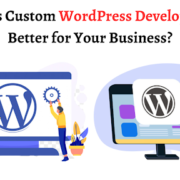Web Apps vs Mobile Apps: What should You Choose and why?
At a first glance, the difference between a web app and a mobile app can seem negligible. But in reality, they are very much different. And the difference isn’t limited to the layout of the app or the way of use but it is also varied in the process of developing and deploying them.
Thank you for reading this post, don't forget to subscribe!A native app is built specifically for the mobile platform. And it can directly be installed on mobile devices. Whenever the user wants to use any native mobile apps they just have to go to the app store and download the applications.
Meanwhile, a web app is something that needs to be used through a mobile or web browser. The user does not have to download the application from anywhere as they are internet-enabled applications.
Although there is a difference between a web app and a website, web apps are generally a kind of website that has a flexible design and is more responsive when accessed through mobile devices.
Web app vs mobile app: What is the difference?
Before we get into the advantages and disadvantages of web apps vs mobile apps, it is important to understand the key differences between both of them.
The web apps are similar to the websites which are nothing more than browser-based HTML pages that are linked together and can be accessed through an internet connection. The major difference between the do not need a mobile app and web apps are that mobile applications are specifically designed to be used on small handheld devices like smartphones and tablets that have a small display and touchscreen interface.
Web apps like any other website can easily display texts, images, and videos. They can also be enabled with mobile-specific features like location-based mapping and click-to-call. While the mobile apps are the applications that can be downloaded from the device’s respective app store like the ios app store, google play store, android market, blackberry app world, and so on.
A user can find an app and download it from a given operating system. The native apps work similarly to the web apps but with a little difference. It pulls the data from the internet so that the user can access it even without an internet connection.
| Category | Mobile App | Web App |
| Platform | Native apps are platform-specific. i.e. Android, ios, etc. | They are not platform-specific |
| Development | The programming language used to develop an app for the Android platform is Java and Swift for ios. | The frameworks used for development include HTML5, CSS3, JavaScript, and so on. |
| User-Interface | Faster graphical UIs | Flexible UI that can be adjusted on any device. |
| Accessibility | Compatible | Non-compatible |
| Costs | Expensive | Relatively less expensive |
| Internet Connection | Not all mobile apps need an internet connection to run on the device. | Every web app needs an internet connection. |
Web apps vs mobile apps: the difference in development
How are mobile apps built?
As we have seen above, the development costs of mobile applications are relatively higher than web apps. The reason behind it is that the app is platform-specific. Therefore, when you build an app across various platforms, you need to start the entire process of design and development right from the scratch for each platform. However, mobile apps are much faster and more advanced in terms of features and functionality in comparison to web apps.
How native mobile apps built?
Native mobile apps are developed with the help of platform-specific programming languages. The developers use swift, objective-c for building an ios app, C# for developing a windows phone app, and java, C++ for creating an android phone app.
Yes, that means if you want your native app to be available for download on Android and iOS devices, you’ll need to build multiple versions that, most likely, won’t have identical user interfaces.
How hybrid mobile apps built?
Hybrid mobile apps are the best of both web and native apps. Technically, it is a type of native mobile app but the user can run it like a web app. Because it functions using the platform’s web view which is just a mini browser configured to run fullscreen.
Hybrid apps also need to be built specifically for each operating system. Hence, the accessibility is similar to that of native mobile apps. Though the hybrid apps are written through programming languages like Javascript, HTML, and CSS, it is packaged for different platforms just like the web apps.
How are web apps built?
Web apps are non-native applications that do not need to write the same code twice, it was one of the most important objectives behind their creation. The non-native tools help the developers to make more efficient apps. They use programming languages like Javascript, CSS, and HTML5.
There isn’t any type of standard software development kit to build web apps in comparison to the standard steps and tools to create craft mobile apps. However, there are plenty of template designs that developers have easy access to. Though the development of web apps is faster and easier than a mobile app, they are very simple in terms of features and functionalities.
By taking the advantage of the latest browser advancements, web apps have started acting more like mobile apps. They are called progressive web apps. Nevertheless, the problems of limited support from the operating system and low functionality stand as it is.
Web apps and mobile apps pros and cons
So, after going through the extensive details of the difference and development processes of web apps vs mobile apps, let us now have a look at the pros and cons of each side.
Advantages of web apps:
- No need for any installation or downloading as the application run in the browsers.
- Easy to maintain because they have a common codebase that is flexible to any platform.
- Updates automatically.
- The development process is easy and fast in comparison to mobile apps.
- Web apps are launched quickly as there is no need to seek approval from the app store.
Disadvantages of web apps:
- Web apps are unable to function without an internet connection.
- Web apps are slower than native mobile apps.
- Since the web apps are hosted on a database that is specific to the app marketplace, they are difficult to discover.
- Quality is poorer than the native mobile apps.
- Since the web apps don’t need any approval from the app store, their security isn’t guaranteed.
Advantages of native mobile apps:
- Mobile apps are faster in comparison to web apps.
- This type of apps can get easy access to the device’s resources like a camera and GPS.
- If necessary data is downloaded once, mobile apps can function even without an internet connection.
- Has a heightened level of security and quality as it needs to pass through the standards to get approved by the app store.
- With the help of developer tools, SDKs, and interface elements, native mobile apps are easier to develop.
Disadvantages of native mobile apps:
- The development costs of native apps are high in comparison to web apps.
- To be compatible with each device platform, the design and development process of the mobile apps is needed to start right from the scratch for each specific platform.
- The updates and the maintenance costs are too high.
- It is difficult to get approval to launch your application in the app store of any specific platform.
Which type of app should I use?
It all depends on your business requirements. You can certainly get a fit-all app but it is necessary that you look for the solution that fits your specific requirements. It would be a better option.
Think about the features and functionalities you want in your application. Then think about your company’s objectives in their relevance. What will be the primary function of your app? Answering such questions will bring clarity as to which way you need to go.
When to build a web app?
If your company objective is to provide an interactive resource for additional information with an internet connection so that the visitors are offered a good user experience, then you must opt for web apps.
If your organization is trying to develop better mobile usability than your recent offerings on the site, then progressive web apps are the perfect pick for you.
When to build a native mobile app?
If you want to build such an application that might need access to the device’s resources like GPS and camera then you must consider choosing the mobile app development. Though the hybrid apps will enable you to use such features, the user-experience it offers is not good enough.
When to build a hybrid mobile app
Though hybrid apps are not as common as web apps and mobile apps, you might be surprised upon hearing the names in the list of companies that use them. Under certain circumstances, the web apps are transformed into hybrid mobile apps to offer native-like advantages including the app marketplace.
Wrapping it up!
There can be so much to consider while making an informed decision on the selection of the best way of app development for your business. But it doesn’t matter what kind of app you are building, it can be anything, a web app, a mobile app, or even a hybrid app.
The most important thing you need to keep in mind is that while developing the application, you need to adopt the user-centric approach. This will help you provide the value and the best experience to your customers which could eventually boost your business growth.
I hope after reading this article on web apps vs mobile apps, you might have gained some insights on the topic. Comment down below if this has helped you in making an informed decision for your business. You can also contact us if you have any queries or suggestions related to the same.











